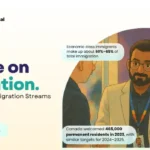Canada Immigration Levels Plan 2026–2028
Transitioning Work Permit Holders to PR
Canada will launch a new program to help up to 33,000 work permit holders become Permanent Residents (PR) between 2026 and 2027.
These workers have already built lives in Canada, pay taxes, and support local economies. Therefore, this transition aims to reward their contribution and address ongoing labour shortages.
Reduction in Temporary Resident Admissions
The government is reducing the number of temporary residents (students + workers) allowed into Canada to balance population growth with housing and infrastructure.
- 2026: 385,000 total (230,000 workers + 155,000 students)
- 2027: 370,000 total (220,000 workers + 150,000 students)
- 2028: 370,000 total (220,000 workers + 150,000 students)
This shows a gradual effort to slow down temporary entries while keeping the economy stable.
Stable Permanent Residence Targets
Canada will keep the annual PR intake steady at 380,000 for 2026, 2027, and 2028 within a flexible range of 350,000 to 420,000.
This signals that the government wants stability, not expansion.
Breakdown for 2026:
- Economic Class: 239,800
- Family Reunification: 84,000
- Refugees & Humanitarian: 56,200
Most new immigrants (about 64%) will come through economic pathways like Express Entry and Provincial Nominee Programs.
Focus on Economic Immigration
Canada’s focus remains on skilled workers who can strengthen key sectors like:
- Construction
- Technology
- Healthcare
- Skilled Trades
This approach helps meet labour shortages while supporting economic growth.
Francophone Immigration Growth
To promote bilingualism, Canada aims to increase French-speaking immigration outside Quebec each year:
- 9% in 2026
- 9.5% in 2027
- 10.5% in 2028
This supports the growth of French-speaking communities across Canada.
Managing Temporary Programs
The new plan integrates temporary resident numbers into overall immigration planning for better control.
This means Canada will:
- Manage international student intakes more carefully
- Limit temporary foreign worker entries to priority sectors
- Ensure housing and public services can keep up
So, while fewer temporary residents will enter, more of them will have pathways to PR if they qualify.
Why These Changes Matter
- Housing: Slower immigration helps stabilize the housing market and gives time for new homes to be built.
- Infrastructure: Ensures healthcare and community services aren’t overburdened.
- Workforce Balance: Skilled workers will continue to meet Canada’s job needs.
- Long-Term Stability: Focuses on quality immigration rather than rapid population growth.
What It Means for Applicants
If you’re planning to study, work, or settle in Canada, here’s how this plan could affect you:
- Firstly, your chances for PR (Permanent Residency) may improve through economic programs like Express Entry or Provincial Nominee Programs (PNP).
- However, approvals for temporary visas may become stricter, so submitting a strong, well-prepared application will matter even more.
- Meanwhile, family and humanitarian programs will continue as usual, with no major cuts or changes.
Conclusion
Canada’s new immigration plan focuses on stability, skilled workers, and sustain ability.
While the pace of immigration slows slightly, the quality and opportunities for permanent settlement grow stronger.
Therefore, this plan represents a balanced approach — one that aligns immigration with housing, jobs, and community needs.
Going forward, the government will share more details about provincial allocations, Express Entry categories, and transition pathways for temporary residents.
Get in touch with SPS Global
Receive professional advice on any of your questions regarding Canadian immigration. get in touch with us, experienced immigration consultants from SPS Global. For additional information, contact support@spscanada.com (Canada) or support.amd@spscanada.com (Ahmedabad), or by phone at (1) 905-362-9393 (Canada) or +919586226232 (Ahmedabad).



